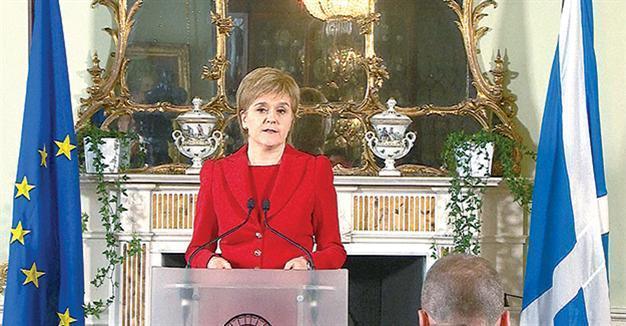Scotland, N Ireland call for vote to leave UK
EDINBURGH/ DUBLIN – Reuters
 Both Scotland and Northern Ireland, whose majority of electorates voted in favor of staying inside the European Union during the referendum on June 23, called votes to leave the United Kingdom.
Both Scotland and Northern Ireland, whose majority of electorates voted in favor of staying inside the European Union during the referendum on June 23, called votes to leave the United Kingdom.Scotland’s First Minister Nicola Sturgeon said that a second Scottish independence referendum was “highly likely” and should take place before Britain leaves the European Union.
Meanwhile, Northern Ireland’s deputy leader Martin McGuinness called for a vote to unite the two sides of the Irish border.
Scotland voted to stay in the EU by 62 to 38 percent in a referendum on June 23, putting it at odds with the United Kingdom as a whole, which voted 52-48 in favor of leaving.
“It is a statement of the obvious that the option of a second independence referendum must be on the table and is on the table,” Sturgeon told a news conference.
“As things stand, Scotland faces the prospect of being taken out of the EU against her will. I regard that as democratically unacceptable,” she added.
“I think an independence referendum is now highly likely.”
Scots rejected independence from the rest of the United Kingdom by 55 to 45 percent in a 2014 referendum, but since then Sturgeon’s pro-independence Scottish National Party (SNP) has surged, winning several elections.
Meanwhile, Ireland’s McGuinness called for a vote to unite the two sides of the Irish border.
Ireland has the EU’s fastest-growing economy but also more to lose than any other member state from Brexit with far-reaching implications for its trade, economy, security of energy supplies and peace in British-ruled Northern Ireland.
After 56 percent of Northern Irish voters sought to remain in the EU compared to the 52 percent of the United Kingdom as a whole who voted leave, Sinn Fein’s McGuinness said it was imperative that London called a referendum on a united Ireland.
“The British government now has no democratic mandate to represent the views of the North in any future negotiations with the European Union and I do believe that there is a democratic imperative for a ‘border poll’ to be held,” McGuinness told national Irish broadcaster RTE.
“The implications for all of us on the island of Ireland are absolutely massive. This could have very profound implications for our economy [in Northern Ireland].”
The call from Sinn Fein, Northern Ireland’s largest Irish nationalist party, was later rebuffed by First Minister Arlene Foster.
Irish Prime Minister Enda Kenny, who has said his government had a full-scale contingency plan in place should its nearest neighbor and largest trade partner vote to leave, called an emergency cabinet meeting shortly after the result.
The outcome has very significant implications for Ireland and the EU as a whole, a government statement said.
















